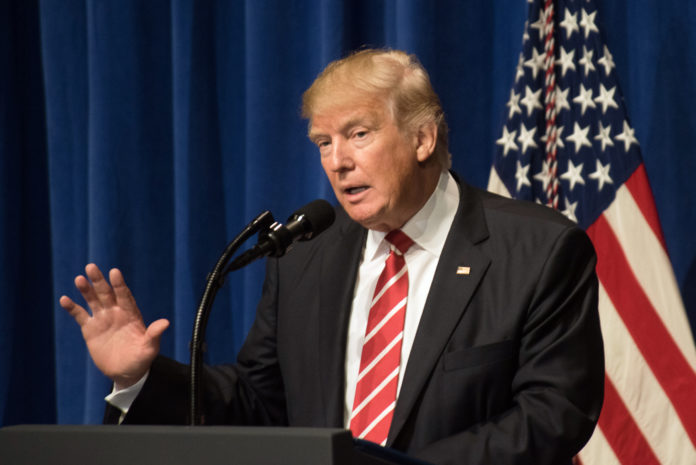
Israel will have to pay a high price
in future peace negotiations with the
Palestinians in return for US President
Donald Trump’s recognition of
Jerusalem as Israel’s capital.
Trump offered the stark warning
whilst addressing supporters during
a campaign rally in Charleston,
West Virginia.
Recalling his landmark ruling and
subsequent decision to move the US
Embassy to the holy city, though
pressured by world leaders not to
make what was viewed a controversial
announcement, the US leader
stood firm due to its historical significance
and long-term benefits.
Explaining his strategy, he said,
“If there’s ever going to be peace,
remember I said it, with the Palestinians
it was a good thing to have
done because we took it off the
table.
“Every time there were peace
talks, they never got past Jerusalem
becoming their capital, so I said let’s
take it off the table.
“And you know what, in the negotiation,
Israel will have to pay
a higher price because they won a
very big thing, but I took it off the
table.
“But they’ll (the Palestinians)
get something very good because
it’s their turn next. Let’s see what
happens.”
The president once again criticised
former Presidents for not
delivering campaign promises to
recognise Jerusalem as Israel’s capital
and move the US Embassy to
Jerusalem.
“I understand now what happened,’
he explained.
“Every president, many, many
presidents, they said ‘we’re going to
do it. We’re going to move our Embassy
to Jerusalem. It’s going to be
the capital of Israel. We’re going to
do it, we’re going to do it’ and then
they don’t do it.
“Politicians, they don’t do it. So, I
said I’m going to do it.”.
Trump outlined the pressure
world leaders applied before his
momentous announcement.
“I now understand why many
presidents before me said they were going to do it and didn’t do it. “I was inundated
with calls from foreign leaders. Every
country: ‘Don’t do it, don’t do it, don’t do it,
please don’t do it, don’t do it!’
“So actually, what I did, about five days
off I stopped taking calls. I said I’ll call you
back next week because I knew what they
were going to ask me.”
Commenting on Trump’s address regarding
the Palestinians getting something “very
good” as it’s their turn at a press conference
in Jerusalem’s King David Hotel during a
diplomatic trip to Israel, US National Security
Advisor John Bolton made it clear the
Jerusalem announcement last December
was not “an issue of quid pro quo.”
Clarifying Trump’s stance he explained,
“As a dealmaker, as a bargainer, he would
expect, you would expect, I would expect
that the Palestinians would say ‘OK, great.
So, we didn’t get that one and now we want
something else. And we’ll see how it goes.
“The fundamental point is that ultimately
this is something that the parties are going
to have to agree on.
“When the parties talk about it and agree,
they’ll decide between themselves what the
price of that, if anything, was.”
Bolton added that there was no timetable
for releasing the administration’s
much-awaited Mideast peace plan despite
media reports to the contrary.
“There’s been a lot of progress on relations
in the region as a result of the process
of going through the possible outlines of
what the plan would look like,” Bolton said.
“There have been dramatic geo-strategic
changes in the Middle East with the recognition
that the Iran nuclear deal has failed
and failed badly so that gives the possibility
of alignment with Israel and many of its
Arab neighbours that nobody would have
predicted years before.”
Bolton also would not discuss US recognition
of Israel’s claim of sovereignty over
the Golan Heights.
“I’ve heard the idea being suggested
but there’s no discussion of it, no decision
within the US government,” he said.
Israel captured land from Syria during the
1967 Six-Day War in a move not acknowledged
internationally.
Transportation Minister Yisrael Katz
claimed there could be US acceptance some
months ago but issues over Israel’s capital
and US Embassy move have stalled talks
with Palestinian President Mahmoud Abbas.
Bolton though did not rule out such a
notion, especially if there is a Palestinian
State.
“I think it’s been the US view for a long
time that ultimately Israelis and Palestinians
are going to have to agree on this,” he said.
“Nobody’s going to impose a peace in
that respect.”
Bolton added that peace talks could resume
with Abbas when he was ready to do
so.
“It’s up to him,” he said.
Bolton though was succinct on Washington’s
fund cuts to the United Nations Relief
and Works Agency (UNRWA), which offers
aid to Palestinians displaced by the 1948
War of Independence.
“UNRWA is a failed mechanism,” he said.
“It violates standard international law on
the status of refugees.
“UNRWA’s program is the only one in
history based on the assumption that refugee
status is hereditary, and I think it is long
overdue that we have taken steps to reduce
funding.”
UNRWA and the Palestinians have warned
cuts will increase hardship in Gaza.
But Bolton blamed Gaza’s predicament on
Hamas
“Much of UNRWA’s expenses really go to
perpetuating the refugee status of the Palestinian
people, and I think that’s a mistake,”
he explained.
“I think it’s a mistake from a humanitarian
point of view, a perpetuation of an unnatural
status.
“I think what we want to see for Palestinians
is real, gainful employment.
“Unless you have functioning economies,
you are never going to have social and political
stability.”









